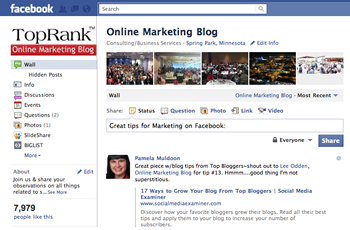 Facebook Marketing is on the mind of just about every company with an online presence, small and large, BtoB and BtoC. The fast pace of the social web right along with changes in consumer behaviors and technology can make it a challenge to nail down specific and enduring best practices.
Facebook Marketing is on the mind of just about every company with an online presence, small and large, BtoB and BtoC. The fast pace of the social web right along with changes in consumer behaviors and technology can make it a challenge to nail down specific and enduring best practices.
Recently I participated in a webinar on social media ROI that took a holistic view of the value created by social engagement, beyond direct customer acquisition. Many of the questions from that webinar reflect the growing curiosity about specific social media applications and websites. We couldn’t get to all the questions so I’ve compiled them into similar topics starting with Facebook.
Some of the questions are fairly common and others are unique. Hopefully you’ll get value from these answers and feel free to ask your own in the comments.
How do we know if a Facebook presence makes sense for our company?
As with any online marketing investment, including social media and networks, determining which social communities a brand should engage with in order to reach a particular business outcome starts with knowing a few key things:
- What characterizes the customer or conversation that you’re after?
- What’s your hypothesis about how Facebook will help you reach a business goal?
- What approach to the social web makes the most sense for engaging identified customer personas and communities for the desired business outcome?
To the extent that Facebook appears as an answer to these questions, it will become clear whether Facebook makes sense as part of an online marketing and social media strategy. These questions are essential for just about any kind of online marketing, not just social media and not just for Facebook.
What is the demographic for Facebook?
Recently Ken Burbary shared a compendium of Facebook demographic information on Facebook: Facebook Demographics Revisited – 2011 Statistics that pretty much answers this question.
You can also get some of the information you need in the process of setting up a Facebook advertisement. The query you perform to identify audience can return useful demographic information.
Does Facebook really get you new customers or just keep you in touch with people who already know who you are?
At TopRank Online Marketing, our key focus on internet marketing and social media strategy is on customer interaction with content. With that bias, I would say the answer to this question about acquiring and engaging customers through Facebook is revealed by understanding your customer preferences for content discovery, consumption and sharing.
These behaviors are certainly present on Facebook pages through the Wall, News Feed, internal and external linking to content and Liking of content. There are myriad ways for new and existing customers to engage on Facebook including interactions initiated due to advertising.
Being able to attract new customers directly through Facebook vs. indirectly or through other social media participation has to do with how your brand conducts itself on Facebook. In many cases, Facebook is part of a multi step sales cycle that attracts interest and then presents offers and information on the company blog, website or other digital experiences that educate.
Recently a client of ours asked whether an ecommerce effort on Facebook made sense for their online store. They have a fairly active Fan page.
My advice was that while we could research the propensity for customers to buy via Facebook, we could also see the low price point of a Facebook store as an opportunity to lead their category with a new feature. Facebook shopping in the short term might not get them a significant increase in direct sales, but it will help show existing customers they’re finding new ways to be innovativel. It’s also newsworthy and could attract new customers via publicity.
One must be careful investing in technology for publicity vs. functionality. Look no further than the obscene amounts of money spent on Second Life for examples of that tactic going awry. But if social features are practical AND newsworthy with a reasonable price point, it’s the kind of investment that can win new customers and reinforce your brand with current customers.
Is it important to add to your Facebook page a certain number of times a week?
Participation on Facebook can start with some guidelines inspired by success with similar efforts, but should be fine tuned to the needs of your own community. We’ve seen some clients daily posting work well while others might post a few times per week.
Facebook Insights provide specific information on how your Fans engage with the page, so start out by posting a few times per week. Keep it focused on being useful and shareable. Increase or decrease post frequency and topics accordingly. Don’t over promote your own information, but follow the themes established in your social content strategy. Ask questions, promote your wall posts and be patient. Give positive feedback to the behaviors you’re looking for and make moderation efforts swift.
How important is it to provide customer service on social media sites like Facebook and Twitter. Do customers expect it?
If customer service on Facebook is part of your Social Media Strategy and hypothesis, then it makes a lot of sense, My personal observations of consumer expectations is that social features are becoming a more familiar part of the online and brand experience. Customers expect to find and interact with search results. They expect blogs with commenting functionality. They look for Twitter and Facebook sharing options when they read brand content. When favorite brands market themselves on social channels it’s not a surprise anymore, its expected. Customer service is no different.
Deciding to embark on offering customer service via social networks like Facebook should be a thoughtful consideration. It’s not something to be started and then killed. Social media monitoring and first hand participation should reveal demand and companies can plan and forecast resources accordingly.
What are some of the best ways to measure conversions on Facebook?
First, we should define what a “conversion” is, in the context of your goals for Facebook participation. Is it attracting “Fans”, signing customers up for a free sample, getting visitors to redeem a Facebook coupon, or making direct product or service inquiries?
According to your goals, the right measurement scheme will provide the best ways to measure conversions on Facebook. There are a number of Facebook analytics approaches and tools worth checking out. Stores within Facebook can measure sales, sites that focus on recruiting staff might count how many applications they get. Other Facebook pages might simply count and qualify the comments, wall posts and community generated content as measures of engagement. It really depends on what you’re trying to achieve.
What goals do you have for your own Facebook Fan pages? How are you measuring success with Facebook Marketing?


